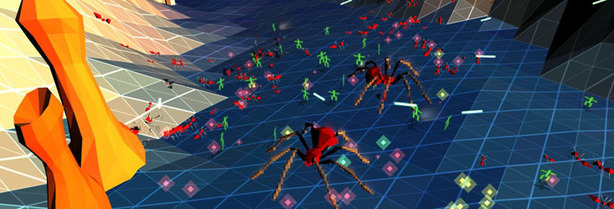Introversion Interview: Big in Britain
April 6, 2010 | 08:26
Companies: #defcon #indie #introversion #introversion-software

The Future of Introversion
BT: At Introversion you’ve been fairly frank with your community about the mistakes you’ve made in the past and how you’ve struggled with some of your titles. Do you think that attitude has helped you to grow a fanbase?MM: I’m a big believer in being open – some people think that you should never show any weakness or internal disagreements, but I think why not? Everyone makes mistakes and by being open about them other people can learn from you or maybe provide other angles that you haven’t even thought of.
I try to be honest and play it straight when I’m working with people and I think that’s the best way to behave.
BT: What are the lessons you’ve learned over the last few years? Is starting a games studio and making a name for yourself as hard as maintaining that name, or is breaking out the hardest thing to do?
MM: Ultimately the ‘name’ follows from the quality of the games. With that in mind, making a name is the same as releasing a great game and maintaining a name means releasing more great games.
When you start out you have no reputation or relationship with people like Valve or Microsoft, but if you have a good enough game concept they’ll go with you. Making great games is hard – the implementation has to be spot on and the idea itself has to be fun and have a certain degree of mass appeal. We’ve had a flop – Multiwinia – and it nearly killed us, but somehow we’re still here!
BT: What’s your opinion on governmental involvement in the games industry, such as TIGA’s recent push for tax breaks? Do you think the government understands how important the games industry could be to the UK’s economic future?
MM: I do think that the government should take more of an interest in the games industry. We have a fantastic heritage of public service broadcasting and public money has always been used to fund film and TV – in my mind games are no different and we need to see an equalisation over the next few years.
A re-distribution of the money which is already being used to support film and TV would be welcome, but I’m not sure a tax break makes sense in the grand scheme of things. We are in the middle of a massive economic downturn, after all.
BT: We get a lot of mail from younger readers who are looking to enter the games industry at some level, but don’t really know where to begin and find themselves confused by the various degrees and educational avenues. In fact, confusion about which courses to take and whether it’s better to be educated or experienced is pretty common, it seems. Do you have any advice to offer from your own experience?
MM: Games are highly technical and complex software engineering projects and computer science is at the heart of all game creation. If you want to be sure of making it into the industry you need to go and get a computer Science, Maths or Physics degree from a top class university. Do that and you’ll be fine.
BT: Lastly (and this is a big one) Is it fair to say that you’ve always done best out of digital distribution rather than bricks and mortar retailers? With more and more sales getting funnelled through systems like Steam, it seems like high street stores are becoming increasingly redundant. How do you think that trend is going to change the shape of the industry?
MM: We started Introversion because the business model at the time was completely on its head. Retailers would demand these huge margins, the distributors would take their cut, followed by the publishers – the developer would see his advance payments but royalties were withheld or spirited away. The content providers, the talent, the people creating the games were the ones making the least money. That was never going to last forever and the internet levelled the playing field and retailers stopped adding value.
Retailing isn’t going to go away for the next 10 years or so, but it is going to get harder and harder for them to make money, but that’s because the money will flow to the developers and that’s right and proper.
And that’s it! Thanks to Mark Morris of Introversion for his time. Pass on your thoughts in the forums and don’t forget to stay tuned for the rest of the week, where we’ll continue Made In The UK week with some more content exploring the UK’s games industry!

MSI MPG Velox 100R Chassis Review
October 14 2021 | 15:04











Want to comment? Please log in.